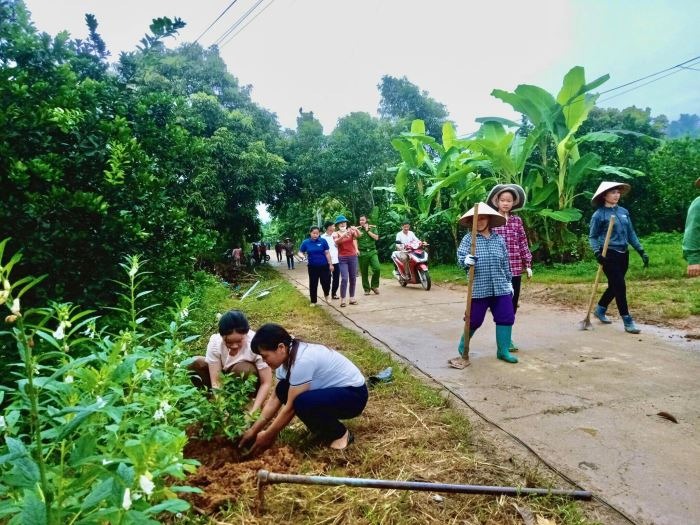– Phìn Hồ Commune, a highland area in Sìn Hồ District, has faced numerous challenges. However, since the implementation of the National Target Program for New Rural Development (NRD), both the local government and residents have been united in their determination to adopt effective solutions. Today, the rural landscape has been transformed, and the lives of the people have become increasingly prosperous.

Upon arriving in Phìn Hồ, one cannot help but be amazed by the remarkable progress in the Mông villages, where people who once relied on shifting cultivation and external aid, and lived in a geographically fragmented area, have significantly improved their conditions. Over time, with the correct policies from the government, difficulties have lessened, the economy has improved, and regions for tea cultivation, fruit trees, and livestock farming have emerged. Consequently, residents’ lives have improved day by day, enabling them to collaborate with the local government in meeting the NRD criteria.
**Boosting Income Standards through NRD in Phìn Hồ Commune**
To achieve results in the NRD initiative, effective utilization of available resources and active public engagement have been crucial. The local government mobilized all officials and civil servants to visit each village, especially the remote and disadvantaged ones, to raise awareness among residents about the benefits and conveniences that NRD brings.
Besides regular village meetings, the commune used various methods such as loudspeakers, posters, slogans, film screenings, and direct dialogues to inform and gather feedback from the community. These efforts helped in identifying and addressing challenges, particularly the crucial criteria directly affecting people’s lives. This approach has not only stabilized the residents’ lives but also strengthened their trust in the NRD process. Additionally, the community was encouraged to contribute labor, land, and financial resources to expedite the completion of NRD projects.

Understanding the importance of income and poverty reduction criteria, residents from the seven villages of the commune have moved away from dependency on external aid and have embraced modern, technical production methods. Agricultural land has been converted into productive areas, including 94.4 hectares of tea plantations, 65 hectares of fruit trees, and 550 hectares of maize and short-term industrial crops, all yielding high productivity. Livestock farming has transitioned from free-range to commercial models, with large-scale farms housing dozens to hundreds of animals.
These animals are well-cared for and vaccinated, ensuring healthy development and providing a substantial supply of meat and eggs to the market. Moreover, the commune has focused on forest protection and development, benefiting from over 2 billion VND annually from forest environmental services. As a result, by the end of 2023, the average per capita income in the commune reached 22.5 million VND, and the poverty rate decreased by 6% compared to the previous year, now standing at 57.8%.
Thào A Thiết, a resident of Tà Ghênh Village, shared: “When the local officials explained the NRD, we were determined to contribute, from donating labor and land for cultural houses, rural roads, and school points. Especially in poverty alleviation, we boldly took out loans, learned new skills, and applied scientific techniques to new economic activities. Personally, I have developed a livestock farm that generates high economic returns. Currently, I have 30 goats and 15 pigs, with an annual income of nearly 150 million VND.”

Inter-commune and inter-village roads are now accessible, with 15.27 km of internal village roads concreted, facilitating transportation and cultural exchanges. Improved transportation infrastructure has also aided in economic development and other infrastructure projects. All villages now have cultural houses, 93% of residents use electricity, 95% have access to clean water, and 100% of school-age children attend school. Outdated customs have been eradicated, culture is being revived and preserved, and the youth actively participate in cultural teams, learning about traditional values to maintain them. Additionally, security and defense are upheld, with residents knowledgeable about the law, actively reporting and combating crime.
**Preserving Traditional Culture Together**
Giàng A Hạng, Vice Chairman of the Phìn Hồ Commune People’s Committee, noted: “Currently, the commune has achieved 11 NRD criteria, including planning, irrigation, electricity, cultural infrastructure, rural markets, information and communication, labor, health, culture, political system, and security. In the future, the commune will continue to mobilize residents to contribute efforts and focus on economic development, integrating state investment resources to prioritize difficult criteria, aiming to achieve 1 to 2 more criteria within this year.”






